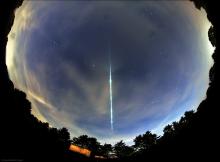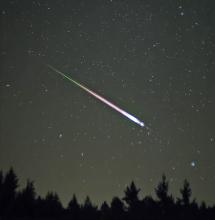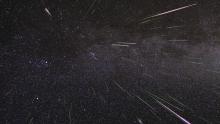Listen to today's episode of StarDate on the web the same day it airs in high-quality streaming audio without any extra ads or announcements. Choose a $8 one-month pass, or listen every day for a year for just $30.
You are here
Geminid Meteors
A reliable meteor shower is building toward its peak, on Wednesday night. There won’t be any moonlight to spoil the show, so if you can get away from city lights, it should be a good display. And if you want some earlier action, try tonight — some meteor experts say we could get an extra sprinkling.
The Geminid meteor shower occurs every December. That’s when Earth zips through the orbital path of its parent asteroid, which sheds bits of rock and dirt as it orbits the Sun. Earth sweeps up some of this debris. It vaporizes as it hits the atmosphere, forming glowing streaks of light.
At the shower’s peak, it might produce a hundred or more meteors per hour. And while most meteor showers are best viewed well after midnight, the Geminids offer more generous hours — from about 10 p.m. until dawn. Best of all, the Moon will be just past new, so it won’t interfere with the fireworks.
There’s a possibility of some bonus meteors tonight. Earth may pass through the path of Comet 46P/Wirtanen. It doesn’t spawn a regular meteor shower, but it does occasionally provide a few sparks. Some calculations show that we could fly through a trail of its “comet dust” tonight. And even if we don’t get those bonus flashes of light, we will get a few early Geminids — a prelude to the main event late Wednesday into early Thursday.
Tomorrow: mapping our place in the vastness of the Milky Way.
Script by Damond Benningfield





